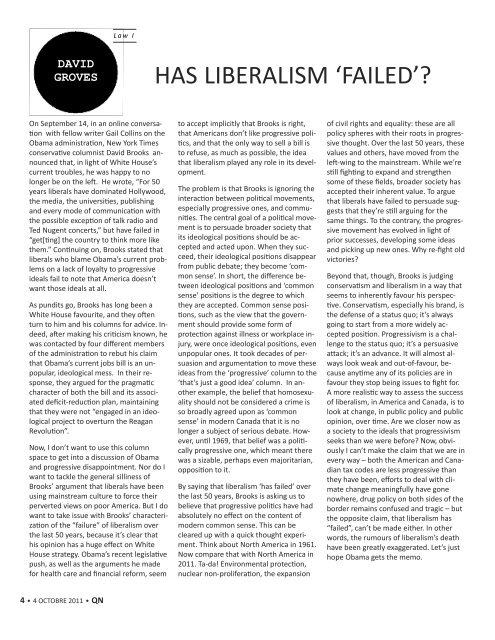October 4, 2011 - Latest Issue - McGill University
October 4, 2011 - Latest Issue - McGill University
October 4, 2011 - Latest Issue - McGill University
You also want an ePaper? Increase the reach of your titles
YUMPU automatically turns print PDFs into web optimized ePapers that Google loves.
L a w IDAVIDGROVESHAS LIBERALISM ‘FAILED’?On September 14, in an online conversationwith fellow writer Gail Collins on theObama administration, New York Timesconservative columnist David Brooks announcedthat, in light of White House’scurrent troubles, he was happy to nolonger be on the left. He wrote, “For 50years liberals have dominated Hollywood,the media, the universities, publishingand every mode of communication withthe possible exception of talk radio andTed Nugent concerts,” but have failed in“get[ting] the country to think more likethem.” Continuing on, Brooks stated thatliberals who blame Obama’s current problemson a lack of loyalty to progressiveideals fail to note that America doesn’twant those ideals at all.As pundits go, Brooks has long been aWhite House favourite, and they oftenturn to him and his columns for advice. Indeed,after making his criticism known, hewas contacted by four different membersof the administration to rebut his claimthat Obama’s current jobs bill is an unpopular,ideological mess. In their response,they argued for the pragmaticcharacter of both the bill and its associateddeficit-reduction plan, maintainingthat they were not “engaged in an ideologicalproject to overturn the ReaganRevolution”.Now, I don’t want to use this columnspace to get into a discussion of Obamaand progressive disappointment. Nor do Iwant to tackle the general silliness ofBrooks’ argument that liberals have beenusing mainstream culture to force theirperverted views on poor America. But I dowant to take issue with Brooks’ characterizationof the “failure” of liberalism overthe last 50 years, because it’s clear thathis opinion has a huge effect on WhiteHouse strategy. Obama’s recent legislativepush, as well as the arguments he madefor health care and financial reform, seemto accept implicitly that Brooks is right,that Americans don’t like progressive politics,and that the only way to sell a bill isto refuse, as much as possible, the ideathat liberalism played any role in its development.The problem is that Brooks is ignoring theinteraction between political movements,especially progressive ones, and communities.The central goal of a political movementis to persuade broader society thatits ideological positions should be acceptedand acted upon. When they succeed,their ideological positions disappearfrom public debate; they become ‘commonsense’. In short, the difference betweenideological positions and ‘commonsense’ positions is the degree to whichthey are accepted. Common sense positions,such as the view that the governmentshould provide some form ofprotection against illness or workplace injury,were once ideological positions, evenunpopular ones. It took decades of persuasionand argumentation to move theseideas from the ‘progressive’ column to the‘that’s just a good idea’ column. In anotherexample, the belief that homosexualityshould not be considered a crime isso broadly agreed upon as ‘commonsense’ in modern Canada that it is nolonger a subject of serious debate. However,until 1969, that belief was a politicallyprogressive one, which meant therewas a sizable, perhaps even majoritarian,opposition to it.By saying that liberalism ‘has failed’ overthe last 50 years, Brooks is asking us tobelieve that progressive politics have hadabsolutely no effect on the content ofmodern common sense. This can becleared up with a quick thought experiment.Think about North America in 1961.Now compare that with North America in<strong>2011</strong>. Ta-da! Environmental protection,nuclear non-proliferation, the expansionof civil rights and equality: these are allpolicy spheres with their roots in progressivethought. Over the last 50 years, thesevalues and others, have moved from theleft-wing to the mainstream. While we’restill fighting to expand and strengthensome of these fields, broader society hasaccepted their inherent value. To arguethat liberals have failed to persuade suggeststhat they’re still arguing for thesame things. To the contrary, the progressivemovement has evolved in light ofprior successes, developing some ideasand picking up new ones. Why re-fight oldvictories?Beyond that, though, Brooks is judgingconservatism and liberalism in a way thatseems to inherently favour his perspective.Conservatism, especially his brand, isthe defense of a status quo; it’s alwaysgoing to start from a more widely acceptedposition. Progressivism is a challengeto the status quo; it’s a persuasiveattack; it’s an advance. It will almost alwayslook weak and out-of-favour, becauseanytime any of its policies are infavour they stop being issues to fight for.A more realistic way to assess the successof liberalism, in America and Canada, is tolook at change, in public policy and publicopinion, over time. Are we closer now asa society to the ideals that progressivismseeks than we were before? Now, obviouslyI can’t make the claim that we are inevery way – both the American and Canadiantax codes are less progressive thanthey have been, efforts to deal with climatechange meaningfully have gonenowhere, drug policy on both sides of theborder remains confused and tragic – butthe opposite claim, that liberalism has“failed”, can’t be made either. In otherwords, the rumours of liberalism’s deathhave been greatly exaggerated. Let’s justhope Obama gets the memo.4 • 4 OCTOBRE <strong>2011</strong> • QN














